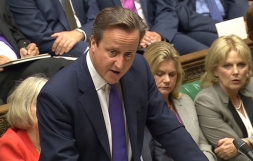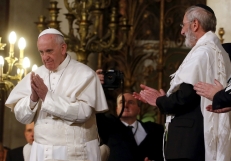Anti-semitism has made a rather ugly re-emergence among the British Labour party.
First Oxford University's Labour Club was investigated after its chair resigned in February alleging a "large proportion" of the club had "some kind of problem with Jews". It is understood this investigation has been extended to other complaints among Labour students.
Then in March it emerged Gerry Downing had been readmitted as a Labour party member, albeit briefly. This is a man who has repeatedly called for the "Jewish question" to be addressed.
Finally on Tuesday Vicki Kirby, a former parliamentary candidate, was suspended for a second time after it emerged she had been readmitted and was vice-chair of the Labour constituency party in Woking. Kirby was initially barred after a string of abusive tweets where she said Jews had "big noses" and said Hitler was the "Zionist God".
She also suggested ISIS should attack Israel whom she described as the "real oppressors".
This came after John Mann, a senior Labour MP, said the party had a problem with anti-semitism.
If Mann is correct then these aren't "one off" incidents and the problem is much more widespread. So why does anti-semitism seem to rear its ugly head comparatively often in the Labour party?
The first thing to note is bigotry is found in all political parties. The difference is those on the right tend to be accused Islamophobia more often than those on the left. For example it was the UKIP peer Lord Pearson who said: "The Muslims are breeding quicker than us" and the assertion that Muslim migrants are "coming here to take us over" has been repeated by UKIP leader Nigel Farage.
However there is no doubt that while Islamophobia is more commonly associated with the right, anti-semitism is more often found on the left.
There are a number of explanations for this.
The most obvious is that left-wingers tend to be more sympathetic to Palestine rather than Israel. In more impassioned cases this boils over into hatred of Israel. This seems to be the case for Gerry Downing who said Israel's "heinous crimes" needed to be held to account.
Clearly a distaste for the policies of the state of Israel should not lead to a distaste for Jewish people in general. As the left-wing commentator Owen Jones wrote, "it is possible to raise the issue of prejudice towards and hatred of Jewish people without immediately invoking the actions of the Israeli government." But you can see how the link is made when the issue is as toxic and polemic as it has become.
One other reason why anti-semitism seems to have lodged itself within the Labour party is the left's instinctive distrust of western intervention overseas. History taught from a broadly left-wing viewpoint will paint a much more damning picture of the British empire, for example, than if taught from a right-wing perspective. Generally speaking, ring-wing people tend to have a more sympathetic view of interventionist foreign policy.
In line with this, those on the left are much more likely to view the creation of the state of Israel in 1948 as unwanted and unnecessary western intervention. This leads on to form a broadly pro-Palestinian consensus on the left. But it also adds to an underlying perception that the state of Israel does not really have the right to exist. Clearly none of these assertions are universal but broadly speaking you are much more likely to find these views on the left than the right.
What is obvious as one delves behind Labour's troubled relationship with anti-semitism is that in most cases, it is more an anti-Zionist sentiment than an anti-Jewish sentiment. This is a crucial distinction to make. It is quite reasonable to be supportive of Palestine. What is not reasonable or acceptable is when this boils over to become anti-Jewish.
And in cases where that does happen, Jeremy Corbyn would do well to listen to his own MP John Mann and not his friends in Hamas.


















